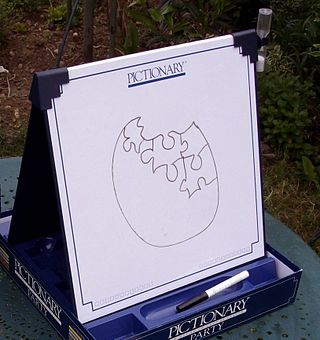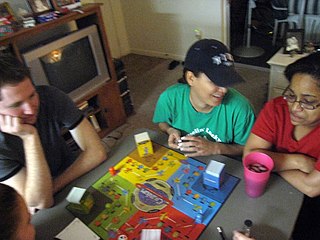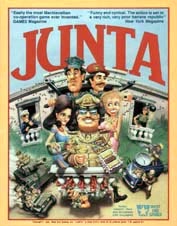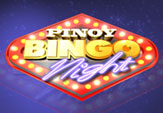Related Research Articles

Pictionary is a charades-inspired word-guessing game invented by Robert Angel with graphic design by Gary Everson and first published in 1985 by Angel Games Inc. Angel Games licensed Pictionary to Western Publishing. Hasbro purchased the rights in 1994 after acquiring the games business of Western Publishing. Mattel acquired ownership of Pictionary in 2001. The game is played in teams with players trying to identify specific words from their teammates.

Card Sharks is an American television game show. It was created by Chester Feldman for Mark Goodson-Bill Todman Productions. The game features two contestants who attempt to predict the outcome of survey questions to gain control of a row of oversized playing cards, then determine whether the next card drawn is higher or lower. The title Card Sharks is a play on the term "card sharp", a person skilled at card games.

Cranium is a party game created by Whit Alexander and Richard Tait in 1998. Initially, Cranium was sold through Amazon.com and the Starbucks coffee chain, then-novel methods of distribution. After selling 44 million copies of Cranium and its sister titles, the game's manufacturer Cranium, Inc. was bought by Hasbro, Inc. for $77.5 million in 2008. Billed as "The Game for Your Whole Brain", Cranium includes a wide variety of activities, unlike many other party games. Giorgio Davanzo handles packaging and branding for the game, and the artwork is by cartoonist Gary Baseman.

Anticipation is a video board game developed by Rare and released by Nintendo for the Nintendo Entertainment System (NES) in 1988. It is playable in either single-player or multiplayer mode, with up to four players competing against each other and/or computer-controlled opponents.

Junta is a board game designed by Merlin Southwell first published in 1978 by Creative Wargames Workshop and published, as of 1985, by West End Games. Players compete as the corrupt power elite families of a fictional parody of a stereotypical banana republic trying to get as much money as possible into their Swiss bank accounts before the foreign aid money runs out. Fighting in the republic's capital during recurrent coup attempts encompasses most of the game's equipment, rules and playtime. This game-within-the-game is however actually tangential to the players' main goal.

Think Fast is an American children's game show which aired on Nickelodeon from May 1, 1989, to March 30, 1990, with reruns airing weekly until June 29, 1991.
Outburst is a game originally devised in 1986 by Hersch and Company of Los Angeles and later licensed by Parker Brothers, now a division of Hasbro. From 2004 - 2015, it has been produced by Mattel, as of 2016, it was licensed back to Hasbro.

Articulate! is a board game from Drumond Park, for 4 to 20+ players aged 12 and up with original concept by Andrew Bryceson. Articulate! players describe words from six different categories to their team as quickly as possible. The teams move round the board based on the number of words correctly guessed and occasional spinner bonuses. The object of the game is to be the first team to get around the board to the finish space.
A number of related games under the Yahtzee brand have been produced. They all commonly use dice as the primary tool for game play, but all differ generally. As Yahtzee itself has been sold since 1954, the variants released over the years are more recent in comparison, with the oldest one, Triple Yahtzee, developed in 1972, eighteen years after the introduction of the parent game.

Bezzerwizzer is a trivia game combining trivia, tactics and trickery. The game was invented in 2005 by the Dane Jesper Bülow. The game's name is a German term meaning "better knowing". In the game, a Bezzerwizzer is a "know-it-all", who counts on outwitting everyone else.
Android is an adventure board game designed by Kevin Wilson and Dan Clark, published in 2008 by Fantasy Flight Games. Set in a dystopian future, where the Moon is colonized and androids and clones are real, players take on the roles of murder investigators, investigating a murder within the fictional cities of New Angeles and Heinlein, a colony on the Moon. Players attempt to gain Victory Points by solving the murder, solving the conspiracy, and/or resolving the investigators' personal issues. The player with the most Victory Points wins the game.

Pinoy Bingo Night is the Philippine game show version of National Bingo Night, which premiered on the ABS-CBN from March 30 to June 26, 2009. It is hosted by Kris Aquino with Brod Pete as the "bingo caller" and Mel Feliciano as the "commissioner", who referees the playing studio audience.

Dixit, is a French card game created by Jean-Louis Roubira, illustrated by Marie Cardouat, and published by Libellud. Using a deck of cards illustrated with dreamlike images, players select cards that match a title suggested by the designated storyteller player, and attempt to guess which card the storyteller selected. The game was introduced in 2008. Dixit won the 2010 Spiel des Jahres award.
Family Game Night is an American television game show based on Hasbro's family of board games and EA's video game franchise of the same name. The show was hosted by Todd Newton. Burton Richardson was the announcer for the first two seasons; he was replaced by Stacey J. Aswad in the third season, and Andrew Kishino was hired for the fourth season. The 60-minute program debuted on October 10, 2010, on The Hub which was Discovery Kids. The network became Discovery Family on October 13, 2014; it was previewed on October 9, 2010, on its sister channel, TLC. Seasons 1 and 2 contained 26 and 30 episodes respectively. Seasons 3, 4 and 5 each contained 15 episodes. Season 2 premiered on Friday, September 2, 2011, with additional games being added. The games added to the second season included Cranium Brain Breaks, Green Scream, Ratuki Go-Round, Simon Flash, Operation Sam Dunk, Trouble Pop Quiz, and Spelling Bee. However games from the previous season were still kept.
The Genius: Rules of the Game is the first season of The Genius debuted on tvN on April 26, 2013.
The Genius: Black Garnet is the third season of The Genius. It debuted on tvN on October 1, 2014.
The Genius: Grand Final is the fourth season of The Genius. It debuted on tvN on June 27, 2015.

Codenames is a 2015 party card game designed by Vlaada Chvátil and published by Czech Games Edition. Two teams compete by each having a "spymaster" give one-word clues that can point to multiple words on the board. The other players on the team attempt to guess their team's words while avoiding the words of the other team. Codenames received positive reviews and won the 2016 Spiel des Jahres award for the best board game of the year.

Faeria is a digital collectible card and turn-based strategy game that takes place on a dynamic playing board set in a fantasy universe. The game was developed and published by the independent Belgian game studio Abrakam, and released for desktop platforms in 2017, for Xbox One and Nintendo Switch in August 2020 and for PlayStation 4 in November 2020. The game was well received by critics, holding a score of 80/100 on reviews aggregation website Metacritic.
References
- ↑ https://www.accesswire.com/752051/Professors-Beloved-Board-Game-Personal-Preference-Gets-a-21st-Century-Makeover-Thanks-to-Dedicated-Fans
- ↑ https://boardgamegeek.com/boardgame/4881/personal-preference
- ↑ https://archive.org/details/games-89-1988-january/page/n61/mode/2up
- ↑ https://archive.org/details/games-94-1988-novembers/page/n57/mode/2up